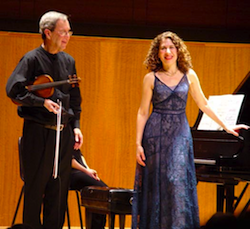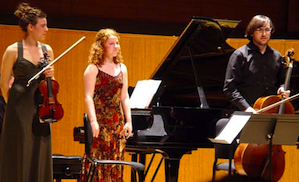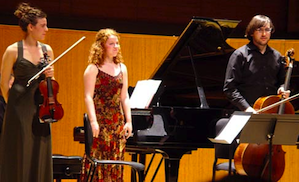
Photos by Michael Strickland
At the Conservatory Thursday evening: fascinating program, brilliant young artists, and a poor start. It's curious that Donald Weilerstein, a world-class artist and important teacher, wouldn't realize that a presentation is very much like a performance — it needs preparation.
Instead, Weilerstein launched into a well-meaning preview of the first work on the program, and made a mess of it. For about 10 minutes, there was giggling in the audience as Weilerstein struggled with a microphone and his violin, trying to speak and play excerpts, all ad-hoc, confused.
All went surpassingly well after that. Weilerstein and pianist Vivian Hornik Weilerstein (parents of Alisa, third member of the Weilerstein Trio, not at the event) gave a superb performance of George Enescu's 1940 Impressions d'enfance, Op. 28, a wondrous piece ranging from striking simplicity to a complex, passionate crescendo resolving in as symphonic a sound as a duo can possibly produce.

At first, there are entertaining musical tricks, the violin depicting sounds of a brook in the garden, a bird in the cage, a cuckoo, and — on the violin's improbably highest notes — a cricket. But the last two movements — "Storm in the night" and "Sunrise" — are pure, gorgeous music, a kind of mini-Tristan und Isolde.
Three super-talented Conservatory students — violinist Noemy Gagnon-Lafrenais, pianist Allegra Chapman, and cellist Emanuel Evans — followed, performing Charles Ives' Trio, composed between 1904 and 1911, and sounding as fresh and contemporary as anything created a century later.
Gagnon-Lefrenais' intensity, Chapman's big sound, and Evans' solid support combined beautifully in the opening Moderato, the virtuoso second movement, and the concluding Moderato con moto. The second movement is titled "TSIAJ (This Scherzo Is a Joke): Presto," but it's more breathtaking than funny. Strains of "My Old Kentucky Home" and other songs float by, sometimes in chromatic scales, Chapman playing the concluding piano cadenza brilliantly.
The last movement is a cascade of varied lyrical and syncopated music, with a great duet between the violin and the cello, culminating in a resounding treatment of "Rock of Ages."
The Weilersteins joined student musicians Douglas Kwon (violin), Kristin Zimmerman (viola), and Evans in a performance of Elgar's 1919 Piano Quintet in A Minor, Op. 84.
Check the Conservatory schedule for a plethora of events, many free.

